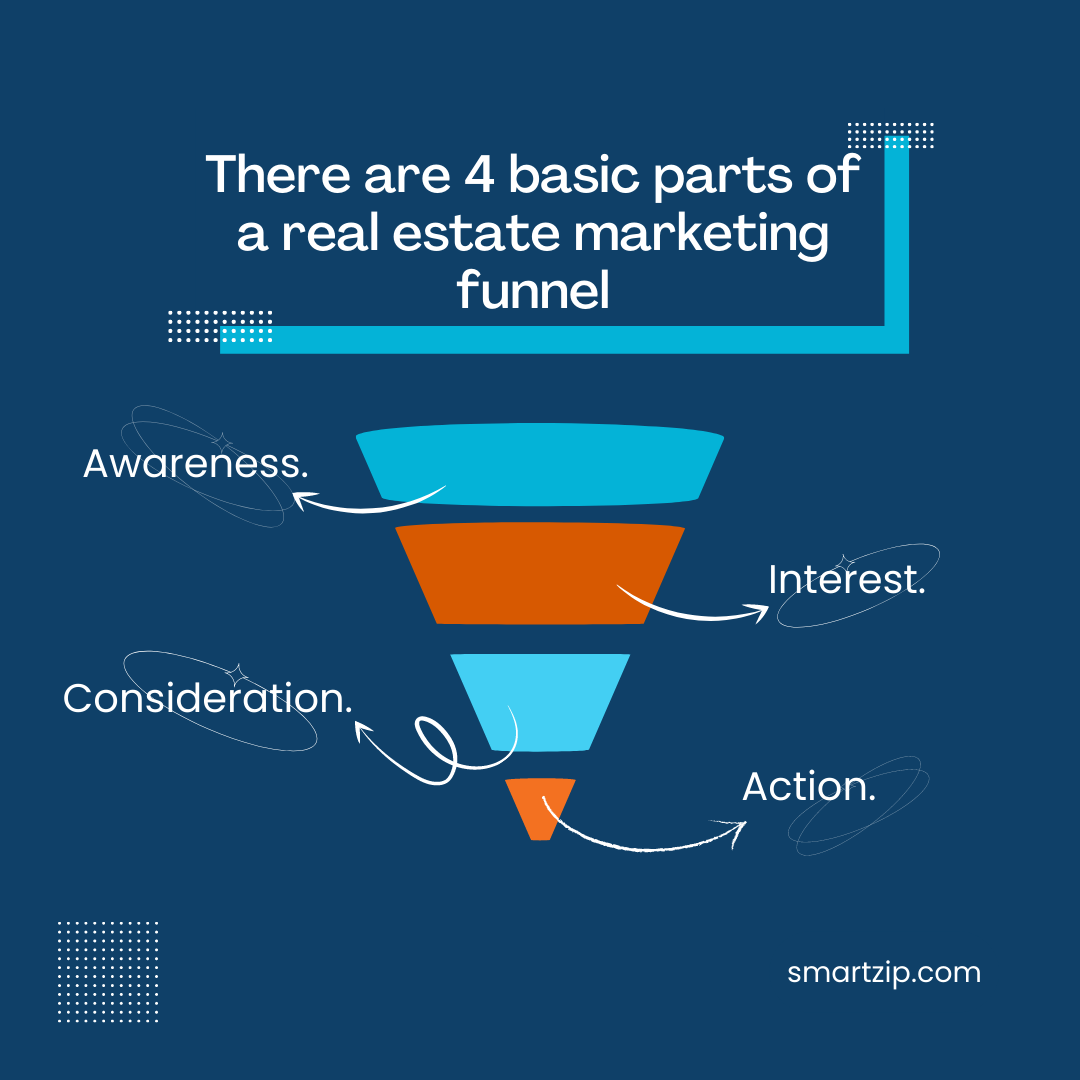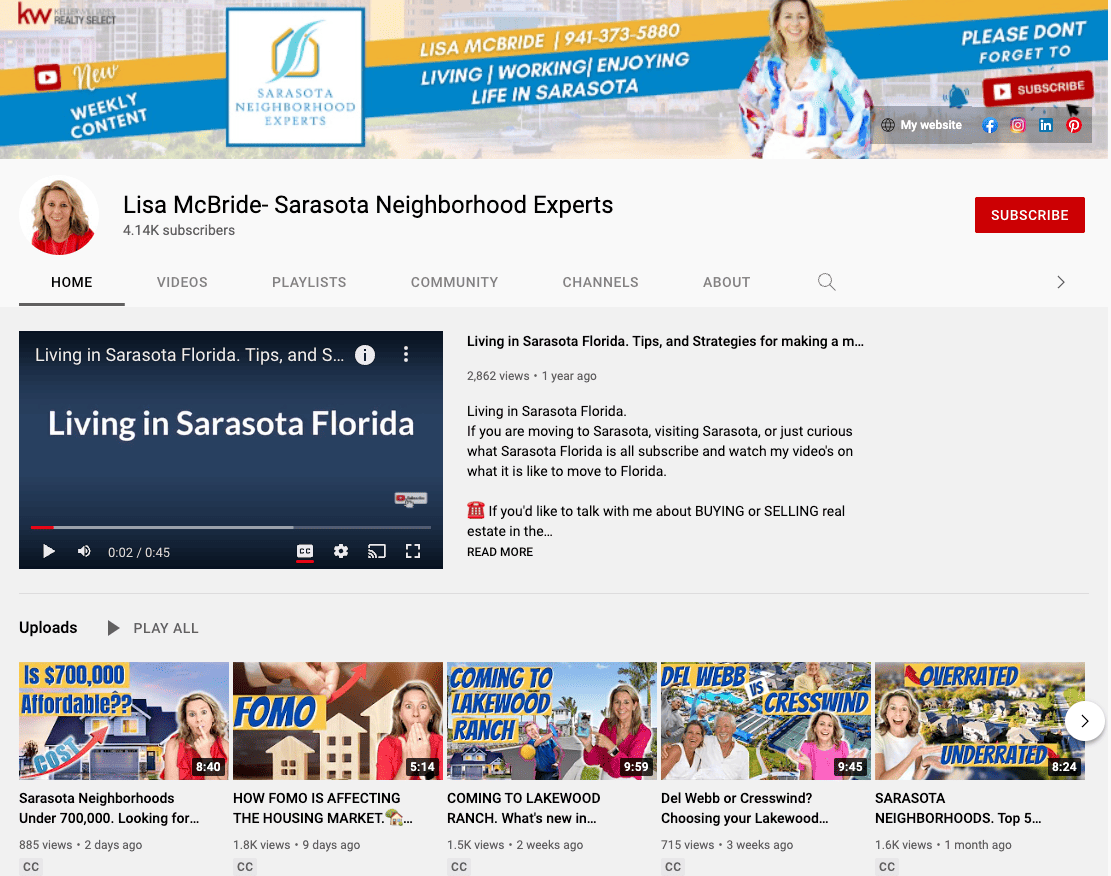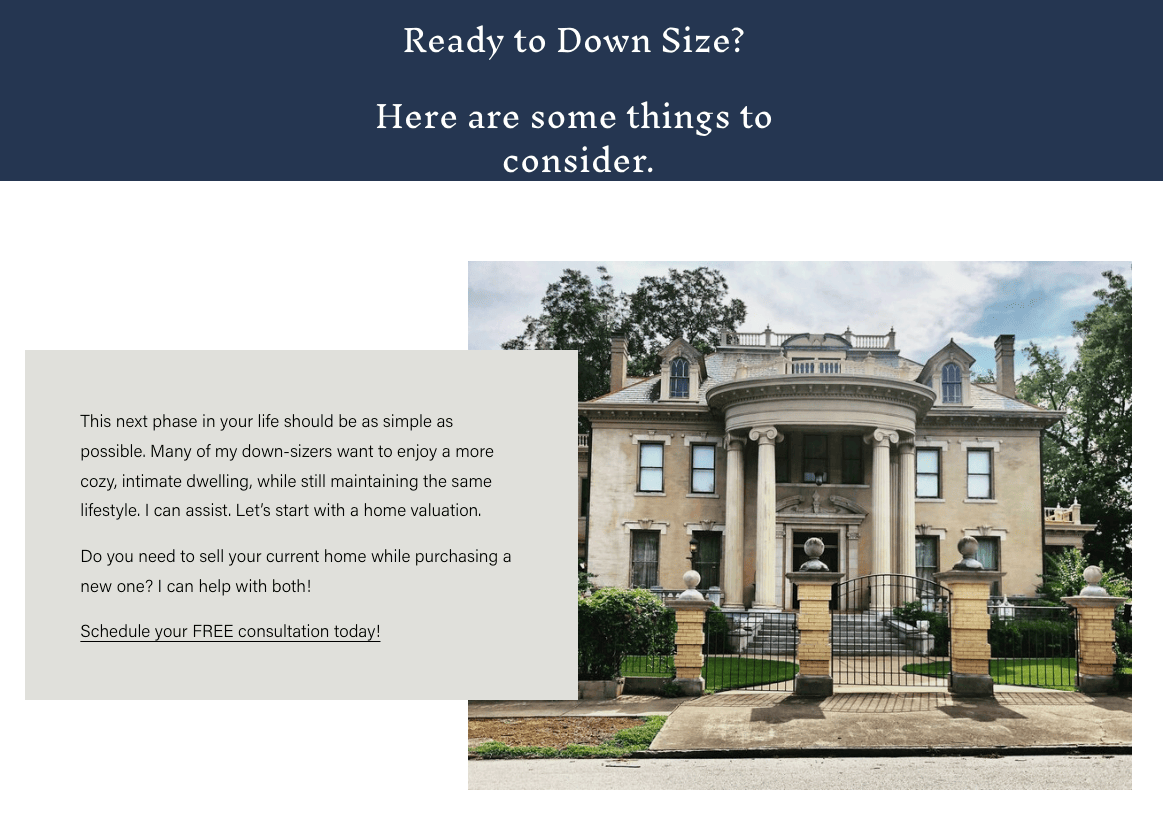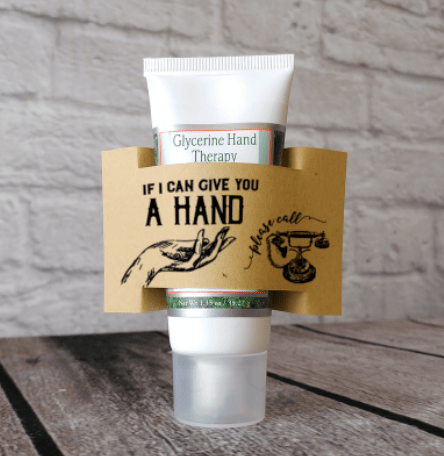How to Get Real Estate Listings & Seller Leads (11 Proven Strategies)
If there's one thing real estate agents need to run a successful business, it's clients. As the real estate market ebbs and flows, it can be difficult to find new listings. In the first half of 2022, the US real estate industry has experienced a seller's market. Low housing inventory has made it difficult for even highly experienced listing agents to consistently secure new listings.
To help you get more real estate listings, we're going to cover 11 of the most impactful strategies for finding seller leads, nurturing and building relationships, and ultimately converting them into sales. Here's what we'll discuss:
- Referrals
- Nurturing existing leads
- Advertising
- Social Media
- Website
- Niche Markets
- Investors and flippers
- Direct mail
- Connecting with your community
- Buying leads
- Leveraging past listings
If you're new to the world of real estate marketing, make sure you read our guide to learn more and get actionable tips, ideas, and answers.
11 Best Strategies to Get Real Estate Listings + Tips
As you go through this list, make sure to always keep your audience in mind. For example, if 90% of the homeowners in your area are over the age of 50, investing in TikTok or Instagram ads probably won't reach them effectively.
However, implementing the following strategies in a way that truly serves the home sellers in your town is key to boosting your real estate business and getting more listing appointments.
For more details on a tool that can sell your listings for more money in less time, try virtual staging.
Example of Stuccco virtual staging
1. Request Referrals
The first strategy to get more seller leads is extremely simple: ask for them.
According to the National Association of Realtors, 68% of sellers who used a real estate agent found them through a referral. That's more than ⅔ of potential seller leads--meaning that referrals are still the single most powerful tool in your arsenal to find more clients.
If you've been avoiding the ask, it's time to dust off your shoulders and get to work. In fact, if you've served your past clients to the best of your abilities in the past, it's extremely likely that they would be happy to share your information with their friends and family!
The good news is that you don't have to set a formal appointment or send some kind of salesy message to get results from referrals. You can start systematically creating a real estate referral system in a way that feels authentic to you--no sweaty palms necessary.
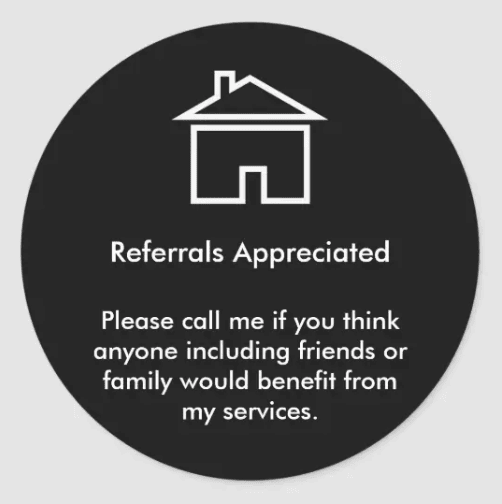
Referral request sticker from Zazzle
First, contact your previous clients the same way that you communicated with them in the past. If you sent them casual texts when you were working with them, send them a casual text to let them know that you're looking for new listings and that you'd love to work with someone they know and trust.
Here are a few more ideas of how you can request a referral without feeling salesy or uncomfortable:
- Post an Instagram story
- Make a short reel or TikTok video expressing that you are ready to sell another home for its best value
- Write a Facebook or LinkedIn post about your opening for new listings
- Send a personalized email to previous clients
- Attach a personalized video to emails with Vimeo or Vidyard
You can even offer an incentive for anyone who connects you with a potential seller, like a gift card to a local coffee shop.
Don't Forget About Business Referrals!
Referrals aren't just for your sphere of influence (SOI). Many real estate agents get their best referrals from other business owners!
If you already have relationships with other professionals in your area who serve the same type of clients, think about creating a referral partnership.
Referral partnerships can be a formal agreement, but it can also be as simple as agreeing to share business. These professional partnerships can be extremely powerful because they put you in contact with homeowners who are actively looking to sell their property. You could create a valuable partnership with:
- Mortgage lenders
- Divorce attorneys
- Insurance agencies
- Retail store owners
- Dentists
- Gyms
- Etc.
If you don't already have potential business relationships, it's worth spending time finding associations to join or building personal relationships.
Get more ideas for referral partnerships, and a sample referral request template in our full guide: Top 20 Ways to Generate Real Estate Leads
2. Nurture Your Current Leads (Improve Your Real Estate Funnel)
When you're feeling pressure to find new listings, it might be tempting to think you need a completely new lead generation strategy. However, you might already have potential seller leads in your pocket that you aren't paying attention to.
In fact, if you already have a real estate funnel set up, your first step to building your pipeline is optimization. Even if you only have a small number of contacts, these are warm leads who could easily become your next sale.
Start by asking: Am I nurturing my current leads and contacts to the best of my ability? Take an honest step back, and think about how you would respond to your own marketing if you were a potential seller. The more objectively you can answer, the better.
If any of your leads have fallen through the cracks, jump on the opportunity to reconnect with them. Then make a plan to prevent any other potential lead from getting lost in the future.
There are multiple phases within a real estate funnel, so you shouldn't expect all of your warm leads to be ready to list today. If you try to rush leads who are in the awareness stage to take an action, you will end up driving them away--the opposite of the result you want. When you initially connect with new leads, try to gain an understanding of where they are in the process, and guide them accordingly.
Depending on your existing real estate funnel, there are an almost endless number of ways that you could make changes and improvements. Regardless of what marketing methods and tools you use, your ultimate goal should be to build a genuine connection with each potential client. A few simple ways to start building this relationship are:
- Personalized email(s)
- Text messages
- Scheduling a phone call
- Buying them a coffee
After you have an authentic connection and a solid foundation with your contacts, start building more content to nurture your leads. With email drip campaigns and content marketing, you can establish yourself as an authority in local real estate and build trust. Read more tips to convert real estate leads into sales.
3. Run Advertising Campaigns
Print advertising has been used in real estate for decades, but online advertising has skyrocketed over the last 15 years. As a whole, advertising is one of the most powerful marketing strategies available in any industry. A strong advertisement, whether it's in print or digital, can start working almost immediately and continue generating results for months.
Print ads like signs or flyers are typically focused on building your brand recognition. This means that you are simply introducing yourself as a real estate expert and providing a simple contact method like a phone number. You can always add unique touches to make your brand more memorable.
Online ads for sellers, on the other hand, can vary much more. They almost always guide users from the advertisement to a landing page which is designed to help you gather as much information about the seller. Most frequently, the landing page includes an offer for a free home valuation in exchange for the user's name, email address, and phone number.
If you want to dip your toe in the water, you can generate a home valuation landing page pretty easily with a number of real estate marketing tools. You can also take it a step further and offer a Comparative Market Analysis (CMA) to users. This can provide them with much more detail, like this example:

CMA template from Etsy
However, advertising is not a quick or easy task, and results are far from guaranteed. It takes an extensive amount of knowledge, technical finesse, expertise, and testing to do well, and it can still take weeks or months to see results.
Since advertising can be incredibly complex, this article won't focus on the logistics or details. However, reference our in-depth article about real estate advertising methods and tips.
4. Get Creative with Social Media
Social media, like online advertising, is an incredibly powerful tool that gives you the opportunity to reach millions of people--something that is simply not possible with old-school marketing techniques like door knocking or direct mail.
However, consumers are completely bombarded with advertisements and social media at all times of the day and night, so actually converting viewers into leads and leads into clients can be extremely difficult. For this reason, it may not be the best starting point for agents who need new listings ASAP, but it's still worth discussing.
The biggest mistake that real estate agents make with social media is getting caught up in the numbers. Creating content is a lot of work, and it can feel like it's useless if you only have a small number of followers.
If you choose to use social media at all, stay focused on the purpose behind it: to find new clients. Unless you have separate goals, building a large audience is not necessary to accomplish this purpose.
When you keep your ultimate goal in mind, you can more effectively create hyper-local and hyper-specific content that serves the people in your area. Posting nothing but your listings and "Happy closing day!" pictures will not help you reach this goal.
Think about a specific problem that home sellers in your area face. For example, do young families struggle with selling their house because they don't want to change school districts? You could take this individual problem and create multiple social media posts on multiple platforms to answer their questions and prove that you are a valuable resource.
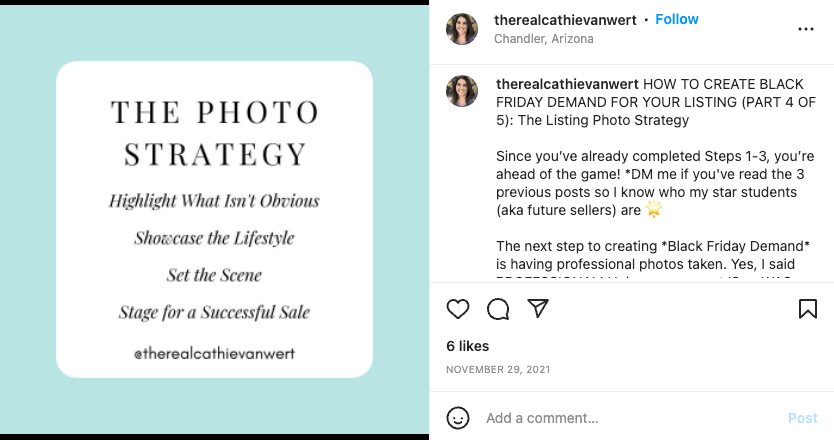
Educational content from @therealcathievanwert
When you publish content that your audience values, you'll naturally be building your authority and trustworthiness. In order to market yourself as an agent even more, you also need to clearly present your work and the past wins you've gotten for clients. Share and re-share past properties that sold over asking price or in record time. Don't forget to share your virtual staging photos periodically and describe how your tools and marketing skills help you maximize home values.


Virtual staging from Stuccco
Not confident in your selling skills? Learn exactly how you can sell a house for the most money.
Key marketing tip: Video has never been more powerful than it is today! It's the most effective medium for grabbing attention, and there are so many different ways to create video that fits your style. You may prefer short-form or long-form video content, and you can repurpose it on Youtube, Instagram, Facebook, TikTok, LinkedIn, and email. Lisa McBride, an agent in Sarasota, Florida, exemplifies this powerful strategy.
5. Transform Your Website Into a Resource
Most agents get a free website when they join their brokerage. In most cases, however, these websites are extremely limited, with nothing more than your title, headshot, and bio.
Creating a real estate website from scratch can take a significant amount of time, energy, and money, so it isn't a wise investment for all agents. However, 78% of all real estate searches start with an online search engine like Google. Real estate professionals who have invested in a website optimized for searches from their audience can attract thousands of views from potential sellers and buyers. It can essentially become a home base for all of your marketing efforts.
Creating a website won't help you get more leads immediately, but it can pay off for months or even years. If you don't have the resources to invest in a website now, single property websites are a great alternative.
Single property websites are basically a landing page dedicated entirely to marketing a listing. They give you space to display the listing photos and write about the home's features in much more detail. Plus, you can create a real estate single property website for free with Stuccco.
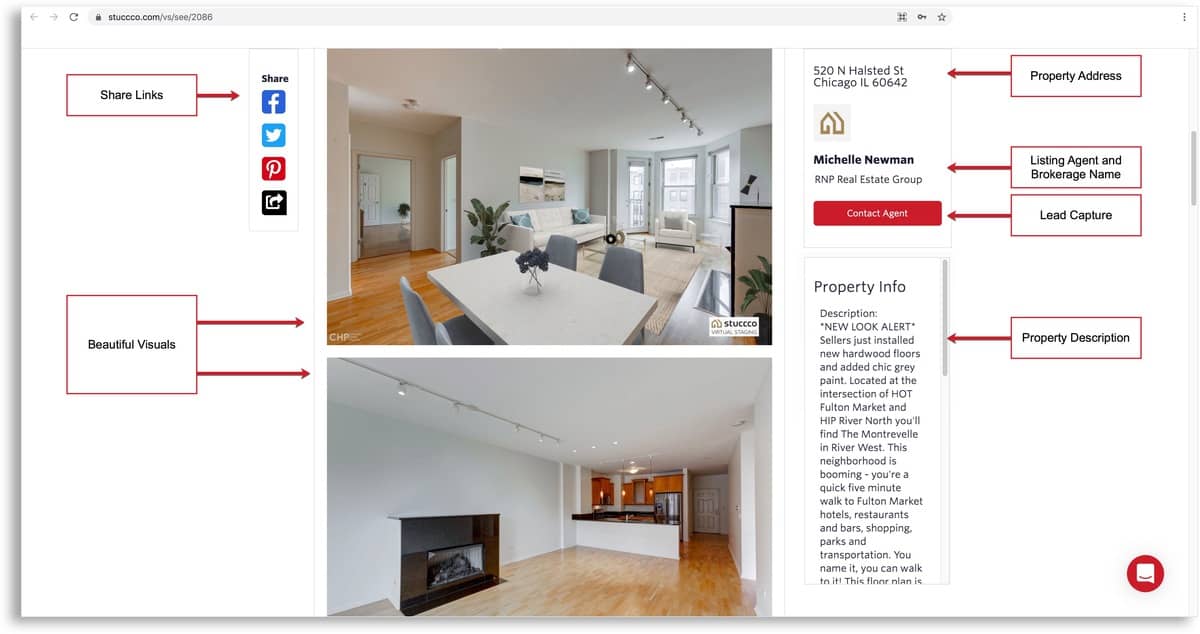
Example of Stuccco's single property website
Get more insight about how to get listing leads with content marketing and SEO in our guide to real estate leads.
6. Focus on Niche Markets
In a low inventory market like the one we're currently in, there are very few available and upcoming listings with a large number of agents vying for them. If you market yourself the same way as every other real estate professional in your area, it will feel like an almost insurmountable competition.
However, every local market has a few listings that other agents don't want or aren't aware of. By thinking about different ways to get new real estate listings, you can set yourself apart from the crowd.
Here are a few types of specialty listings with less competition:
- FSBO listings (For Sale By Owner)
- Expired listings
- Foreclosures
In order to find listings like these, you will have to start operating differently that the majority of agents. You'll also need to figure out unique ways to introduce yourself to these type of clients, since they will have very different wants and needs than the typical homeowner.
Alternatively, if you don't want to go all-in on specialty niches, you can still establish authority in a specific subset of listings in your area. Narrow down the pool of possibilities by location, type of home, or even type of audience. If you can learn the ins and outs of sell mountain homes or reaching Millennial buyers, you'll have an immediate advantage over other agents.
7. Work with Real Estate Investors and Flippers
Working with real estate investors and flippers could become a niche of its own, but it doesn't have to. Even though neither investors or flippers exclusively list homes for sale, building a relationship with the right investors can ensure you a steady stream of listings from a trustworthy seller.
The key to working with investors is to know exactly how you can help them. Many investors already have a good amount of real estate knowledge, so they need concrete reasons to hire an agent and give up 3% of their income. Start by building your skills in these areas:
- Finding and evaluating good investments
- Finding off-market properties
- Calculating renovation costs
- Networking with hard money lenders
- Negotiation
- Hyper-local knowledge
8. Send Direct Mail or Unique Gifts
Direct mail is a classic real estate marketing technique. These days, it's not used quite as widely as it once was, but that doesn't mean it's isn't effective. In fact, direct mail is especially useful for reaching property owners.
Digital marketing can help you reach large numbers of people, but it takes a massive amount of expertise to actually target homeowners in your area online. Direct mail, on the other hand, reaches homeowners in the exact location that you want to target.
You can even automate direct mail by using EDDM (Every Door Direct Mail), which does the printing, packaging, addressing, and mailing of your materials. There are also some great options for direct mail strategy, like ProspectsPLUS! or Wise Pelican.
In order to maximize your impact, take this powerful marketing strategy and add your own unique approach. It could be as simple as choosing unique branding colors, an unconventional headshot or tagline.
Direct mail can still be extremely powerful, but you should make it unique in some way to stand out. This could be minor, like making unique brand colors, adding a QR code to flyers, using an unconventional headshot or tagline.
You could also do something much more noticeable, like sending unique objects in the mail instead of a plain flyer. These are often called "pop-by gifts," and they are extremely effective at getting homeowners to stop and pay attention to your message.
9. Get Involved with Your Community
Even though so much of real estate transactions, marketing, and networking happens online, building relationships is still the #1 way to get dedicated leads and clients.
When users find you online, it can take months of receiving your social media or emails before they're ready to actually reach out to you. On the other hand, it's very easy for people to reach out to you after they've met you in person and made a connection.
No matter how advanced your digital marketing and lead generation strategies get, you should still prioritize in-person relationship building. Here are a few ways to do so:
- Attend events
- Volunteer to help at events and charities
- Host or sponsor events
- Join networks and associations (Search for events in Google or on Meetup.com)
- Engage and support local businesses (Building connections within your community includes other professionals and business owners!)
You can also use online platforms for neighborhoods like NextDoor, or start a Facebook group for your neighborhood.
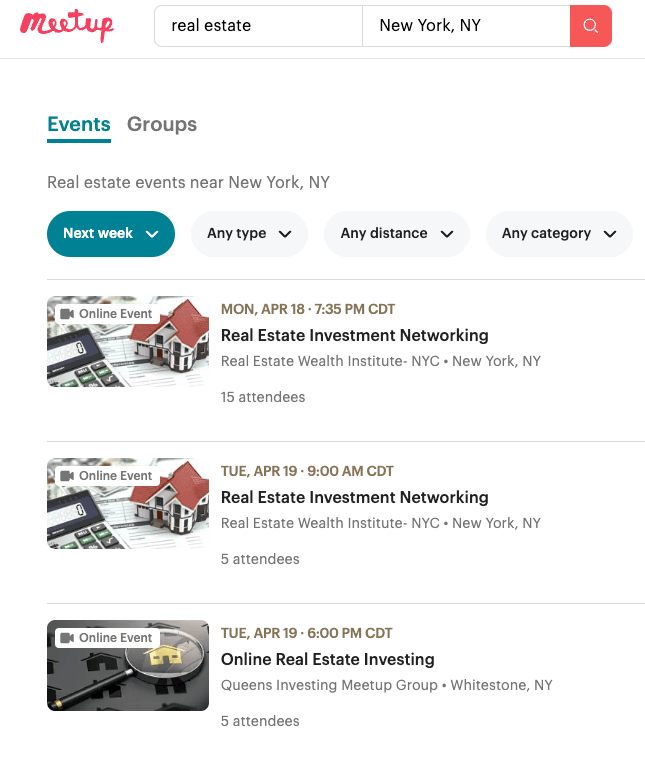
Real estate meetings on Meetup.com
10. Buy Real Estate Listing Leads
Listings leads are out there, but it takes some intentional work to find them. However, the option to simply buy new leads is always available. There are plenty of lead generation companies that provide marketing tools or simply provide you with new listing leads, like:
- Realtor.com
- BoldLeads
- Market Leader
- REDX
- Qazzoo
- Offrs
Every lead generation tool works differently, so make sure you have a clear budget and goal before choosing the right one.
11. Leverage Existing Listings & Marketing Expertise
You don't need to approach the task of getting more listings from scratch. If you've sold even one house in the past, you have an incredibly powerful tool to market your abilities to potential sellers. Use your past listings and the expertise you've gained to show homeowners exactly how you could help their house sell for the best value.
By displaying some of your listing marketing strategies and some of the "behind the scenes" of selling a house, you'll automatically stand out from other local real estate agents. This can be done in so many different ways, including social media, direct mail, "just sold" postcards, and even door knocking.
Here are a few examples of how other agents leverage their existing listings and expertise:
1. "Ready to Sell?" Postcard

Design by PostcardMania
This postcard displays three listings that have already been successfully sold by this brokerage, which immediately makes a point that they know what they're doing. It also offers three different services for home sellers, which keeps the focus on the recipient instead of the brokerage.
2. "The Right Way" Postcard

Postcard design by Printer Bees
This postcard uses just one simple image and focuses on describing why homeowners need you--an expert--to sell their home. It's important to note that they use language like "proven plan of action" and "first-rate service and marketing" to describe exactly what their listing clients will receive.
3. Educational Facebook Post
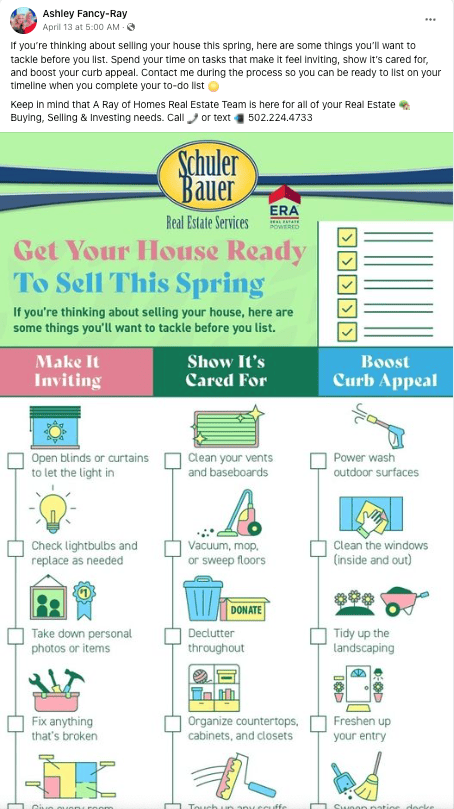
Facebook post by Ashley Fancy-Ray
Although this social media post doesn't actually show any of this Realtor's previous listings, it clearly shows her experience and knowledge. There is so much valuable information packed into this post that potential listing leads will likely want to come back and reference. In fact, this agent could even repurpose this graphic in an email or flyer.
4. Generate Engagement with Virtual Staging
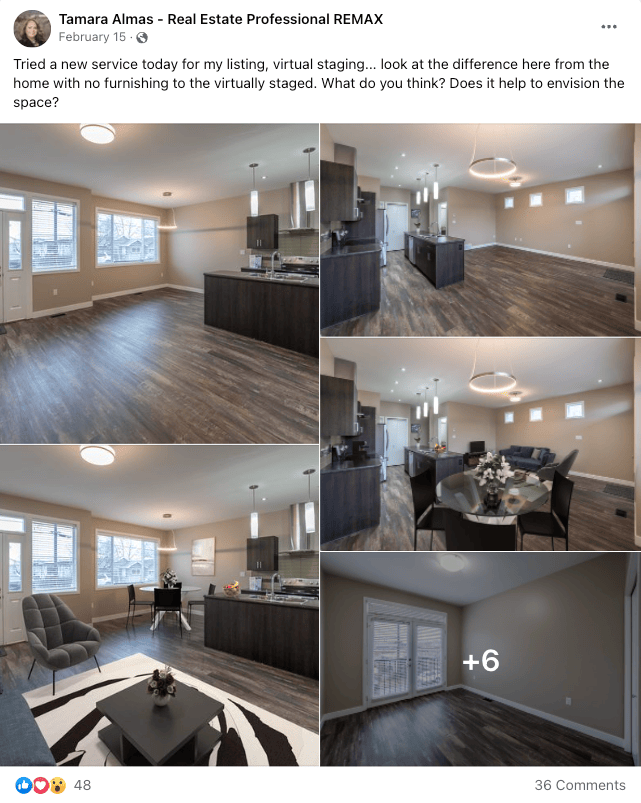
Facebook post by Tamara Almas
In this social media post, the Realtor doesn't make a direct call to action. Instead, she asks her followers and viewers about their opinions on this marketing tool. As a result, her post generated plenty of engagement from others who mention how much they loved the virtual staging service. This type of marketing makes it easier for potential leads to see how this agent knows how to sell a house for the best value.

Stuccco virtual staging
Real estate listings are out there--even in low inventory markets. It's not always easy, but it is always possible to get more real estate listings when you put in the work and use the 11 strategies presented above.
Don't forget to use virtual staging to help sell your current listings for the best price and market to future listings. Try it today!

